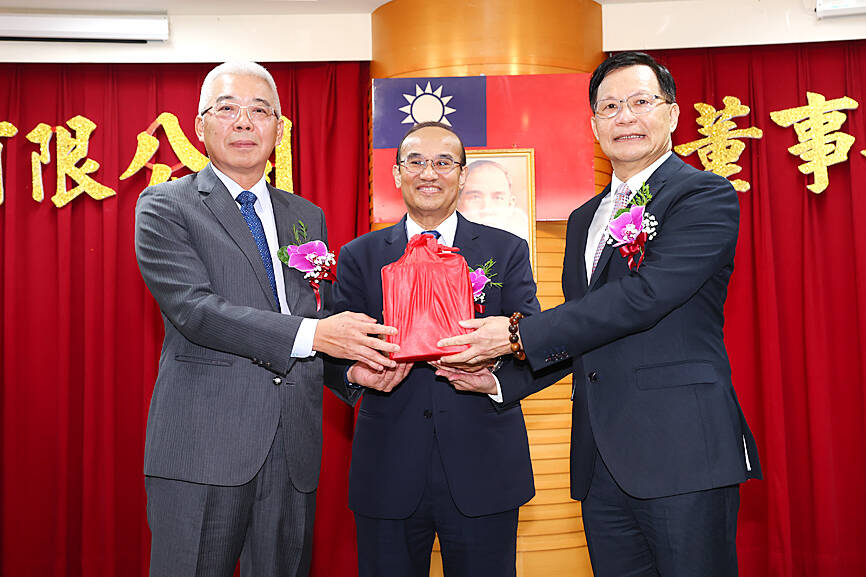State-owned oil refiner CPC Corp, Taiwan (CPC, 台灣中油) has proposed a four-year capital increase plan to improve its financial health after accumulated losses reached NT$62.7 billion (US$1.96 billion) as of the end of last month, about 48 percent of the company’s paid-in capital of NT$130.1 billion.
The company plans to inject NT$350 billion in new capital over a four-year term, pending approval by the Ministry of Economic Affairs, new CPC chairman Fang Jeng-zen (方振仁) said at an inauguration ceremony in Taipei.
CPC, a leading oil product provider and gas importer in Taiwan, plays a highly strategic role in the government’s energy transformation drive to boost the nation’s share of natural gas in power generation and develop alternative energy sources such as geothermal and hydrogen power as part of a push toward net zero emissions.

Photo: CNA
The company reported pretax losses of NT$30.4 billion in the first 10 months of this year, mainly due to its absorption of international oil and natural gas price hikes to avoid passing the higher costs to consumers.
Under a government policy to keep domestic consumer prices stable and local fuel prices lower than neighboring markets, the company is required to absorb part of price hikes.
To be sure, CPC is facing growing financial pressure under that policy, after absorbing NT$400 billion from 2021 to last year and spending NT$22.39 billion to absorb higher fuel costs in the first nine months of this year, Fang said.
The company would seek government support to reasonably reflect its oil and gas costs in retail prices, and also hopes the government can allocate subsidies or allow the company to increase its capital to bolster its financial health, he said.
To meet demand for natural gas from state utility Taiwan Power Co (Taipower, 台電), industrial users and households in northern Taiwan, CPC is building its third liquefied natural gas (LNG) receiving terminal in Taoyuan’s Guantang Industrial Park (觀塘工業區).
CPC expects to complete the first phase of construction and start supplying natural gas to Taipower’s Datan Power Plant (大潭電廠) in March next year, Fang said, adding that the project is scheduled to be completed in 2029.
The company also plans to construct a new LNG receiving terminal in Kaohsiung’s Siaogang District (小港), and expects to conduct a second environmental impact assessment review for the site by the end of this year, he said.
The company’s existing LNG receiving terminals in Kaohsiung’s Port of Yungan and the Port of Taichung would undergo expansions to ensure sufficient gas supply, he added.
The Executive Yuan late last month approved the appointment of Fang as CPC chairman, replacing Lee Shun-chin (李順欽), while Michael Chang (張敏) was promoted from vice president to president, replacing Fang.
At yesterday’s inauguration ceremony at CPC’s headquarters in Taipei’s Xinyi District (信義), Vice Minister of Economic Affairs Lien Ching-chang (連錦漳) said the new CPC leadership would have three key tasks: enacting carbon reduction, promoting artificial intelligence and developing green energy.
The government expects Fang and Chang to help engineer a corporate transformation at CPC, Lien added.

Taiwan’s long-term economic competitiveness will hinge not only on national champions like Taiwan Semiconductor Manufacturing Co. (TSMC, 台積電) but also on the widespread adoption of artificial intelligence (AI) and other emerging technologies, a US-based scholar has said. At a lecture in Taipei on Tuesday, Jeffrey Ding, assistant professor of political science at the George Washington University and author of "Technology and the Rise of Great Powers," argued that historical experience shows that general-purpose technologies (GPTs) — such as electricity, computers and now AI — shape long-term economic advantages through their diffusion across the broader economy. "What really matters is not who pioneers

In a high-security Shenzhen laboratory, Chinese scientists have built what Washington has spent years trying to prevent: a prototype of a machine capable of producing the cutting-edge semiconductor chips that power artificial intelligence (AI), smartphones and weapons central to Western military dominance, Reuters has learned. Completed early this year and undergoing testing, the prototype fills nearly an entire factory floor. It was built by a team of former engineers from Dutch semiconductor giant ASML who reverse-engineered the company’s extreme ultraviolet lithography (EUV) machines, according to two people with knowledge of the project. EUV machines sit at the heart of a technological Cold

TAIWAN VALUE CHAIN: Foxtron is to fully own Luxgen following the transaction and it plans to launch a new electric model, the Foxtron Bria, in Taiwan next year Yulon Motor Co (裕隆汽車) yesterday said that its board of directors approved the disposal of its electric vehicle (EV) unit, Luxgen Motor Co (納智捷汽車), to Foxtron Vehicle Technologies Co (鴻華先進) for NT$787.6 million (US$24.98 million). Foxtron, a half-half joint venture between Yulon affiliate Hua-Chuang Automobile Information Technical Center Co (華創車電) and Hon Hai Precision Industry Co (鴻海精密), expects to wrap up the deal in the first quarter of next year. Foxtron would fully own Luxgen following the transaction, including five car distributing companies, outlets and all employees. The deal is subject to the approval of the Fair Trade Commission, Foxtron said. “Foxtron will be

INFLATION CONSIDERATION: The BOJ governor said that it would ‘keep making appropriate decisions’ and would adjust depending on the economy and prices The Bank of Japan (BOJ) yesterday raised its benchmark interest rate to the highest in 30 years and said more increases are in the pipeline if conditions allow, in a sign of growing conviction that it can attain the stable inflation target it has pursued for more than a decade. Bank of Japan Governor Kazuo Ueda’s policy board increased the rate by 0.2 percentage points to 0.75 percent, in a unanimous decision, the bank said in a statement. The central bank cited the rising likelihood of its economic outlook being realized. The rate change was expected by all 50 economists surveyed by Bloomberg. The